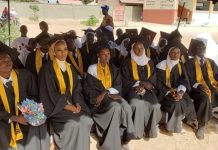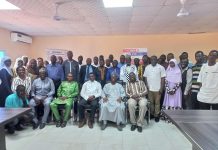By Mariama Marong
The University of the Gambia (UTG) on Thursday the 6th May, gathered stakeholders to validate national languages curriculum to be introduced in the university by next semester.
The validation event, which was held at the university campus at Kanifing, was initiated by the university and championed by the School of Arts and Sciences of the UTG.
Linguistics expects in Gambian languages demonstrated the value of local languages in the educational system as self-independence.
Professor Pierre Gomez, UTG Acting Vice Chancellor (Academies), described the validation as a turning point in the history of the university as linguistics expects longed for it.
“The university will lead the creation of Mandinka 101, Fula 101 and Wollof 101 etc. in the university curriculum and later expand linguistics in the school structures where people can write BA in local language in the Gambia,” he said.
Professor Gomez said students are taught in various foreign languages in the Gambia, but they are not taught in their national languages.
“Yet we called ourselves independent and what type of independence is that, when you speak your own national language without knowing how your language is structured,” he said.
He further said there is need to decolonize the curriculum as well as the mindset of people regrading national languages, so as to empower them to take the lead.
Dr Abdul Karim Kamara, Dean of School of Arts and Sciences, said his department initiated the teaching of national languages in the school for the advancement of education in the country. Dr Kamara, who is also the head of humanitarian and social sciences, said the national languages are fading away.
“If something is not done about it, it is going to have a negative impact on the generation to come,” he said.
He said the UTG should take the lead and rescue the national languages from dying, by preserving them before it’s too late.
“There might be challenges in the process and it will not be easy to adopt with the situation. But someone needs to take a start and that is what the university has done,” he said.
Sidia Jatta, lawmaker and linguistics specialist, said people, who do not language, have no identity. He described language as a fundamental factor that “defines who you are as a human being and it is rooted in culture.”
“Why are Africans teaching their children foreign languages even after colonialization and people still believed that is civilianization or modernization?” he asked.
Jatta said people are incapacitated in their own language because they don’t use the instruments that are fundamental due to the foreign languages that are rooted in the system of education.
“We have the means to survive in this country with dignity and without being slaves to anybody,” he said.
“Since independence to date, the country is totally with no development because the country doesn’t have the key to development. Your key to development is your language,” he said.
UTG Vice Chancellor, Professor. Faqir Mahammad Anjum, said the usage of Gambian languages will ensure equality and democratic participation of the people in the development of the country.
He said the poor performance of the pupils and students is largely associated with the lack of understanding of the language used in classrooms as a medium of instruction
He said the introduction of Gambian languages, as a general requirement, in the university system is a clear testimony of the commitment to the development of the country and which will pave way for the revival of Gambian cultures.
The Vice Chancellor noted that his institution is working on establishing a linguistics department which will give students the opportunity to explore Gambian languages in Phonology, Morphology, Syntax, and Semantic, all in a quest for the development of the country.





















